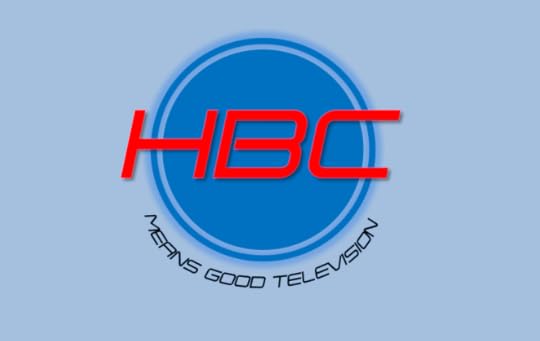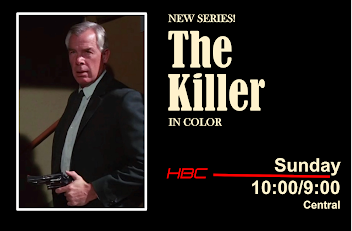If I ran the network

 A while back, I had a note from James McGrail, a loyal reader and regular commentator, who had an interesting suggestion for a new series of articles:
A while back, I had a note from James McGrail, a loyal reader and regular commentator, who had an interesting suggestion for a new series of articles:Have you ever thought about a blog post on TV series ideas from your imagination? Shows you'd love to propose to Hollywood producers, but you don't because you know they'd screw it up.
Brother, you're speaking my language here. Over the years, I've had several ideas that I thought would make for good, or at least interesting, television series. However, having read Cleveland Amory's experience seeing his own series concept, O.K. Crackerby, turned into, well, something other than what he'd conceived, I have no doubt my own ideas would meet a similarly horrific fate.
Nevertheless, I persist. Also, it makes for good writing ideas.
l l l
 The premise of The Killer was simple: The Equalizer with a license to kill. It would have starred Lee Marvin*, who was alive at the time (I suppose now it would be Liam Neeson) as a man who wore only the finest suits, dined at the most elegant restaurants, drank the finest wines, and was a connoisseur in art and literature. He was also a professional assassin, an independent contractor with no ties to the mob or any other organization, who accepted assignments only through referrals from previous clients, and only if he was interested in the job.
The premise of The Killer was simple: The Equalizer with a license to kill. It would have starred Lee Marvin*, who was alive at the time (I suppose now it would be Liam Neeson) as a man who wore only the finest suits, dined at the most elegant restaurants, drank the finest wines, and was a connoisseur in art and literature. He was also a professional assassin, an independent contractor with no ties to the mob or any other organization, who accepted assignments only through referrals from previous clients, and only if he was interested in the job.*Of course, Marvin would never have returned to series television; he'd already done that gig with M Squad. But if you want to know why I always thought of him in the role, just watch two of his movies: Point Blank and The Killers. You'll get the idea.
His clientele, we would learn in the pilot, were desperate people who found themselves in hopeless situations, often through no fault of their own. They were victims themselves: trapped in abusive marriages or manipulative business deals, at the mercy of corrupt union officials or small-town elected politicians, survivors of ruthless crimes that had gone unpunished, living with constant threats hanging over their heads. There was no hope of them finding a conventional solution through law enforcement agencies or legal remedies, and anyone attempting to intervene on their behalf might find themselves badly beaten in a dark alley, or even dead. In other words, chances for a peaceful resolution to their situation were pretty remote, and they were now at their wits' end.
He'd put you through a test before he'd agree to take your job, though. If you were lying to him or deceiving him, if your reasons for hiring him weren't compelling enough or justifiable, or if he found out you were using him for personal gain (a philandering husband making up a story in order to hit his wife or mistress, for example), he might well come back and kill you. He was up front about that.
It was a bit of a reaction to The Equalizer, which was popular at the time. I found that McCall, the Edward Woodward character, wasn't nearly tough enough for my taste. (Unlike, for example, Denzel Washington's version.) Oftentimes, the episode would end with a scene that was the equivalent of those Westers where Hopalong Cassidy shoots the gun out of the villain's hand, leaving him otherwise unhurt.
Not that every episode of The Killer would necessarily end with a killing; one of the great things about Lee Marvin as an actor is the world-weariness he was able to project, the sense that there had to be an easier way for something to be handled. In this series, he would often give his prey a way out, exhibiting that same weariness—"Look, you and I both know there's no way out of this for you. Why don't you just do the right thing [pay him off, leave the woman alone, whatever]? It's a lot less messy, and it makes my job a lot easier." Of course, the bad guys (or femme fatales; I believe in equal opportunities) would generally be arrogant enough to react contemptuously to his suggestion, which would leave him no alternative. . .
Sure, it was derivative and manipulative, contrived and somewhat implausible—all qualities that were in the best tradition of successful TV series. There was a point to it all, though, something that I hoped would elevate it to the status of what is today called "prestige television." Remember, this was in an era when the television antihero was limited to characters like J.R. Ewing, whose worst crimes might have been sleeping with someone else's wife or swindling an associate on a business deal. Even J.R., however, wasn't likely to actually murder someone in cold blood; that was something you were more apt to see happen to him, rather than by him. It would have been episodic, with a new case each week, rather than featuring continuing storylines; in that sense, it was pretty conventional.
However, there was a point to all this that I wanted to build up to, something that would challenge viewers and make them think about what it was they were watching. To challenge them—and, in that sense, to challenge their own ideals, their sense of right and wrong, their concept of justice. For here we had a protagonist with whom viewers were clearly meant to identify. The people he hunted down were child abusers, rapists, corrupt public officials, and the like, cruel and manipulative and worthy of our scorn and hatred. You sympathized with their victims, and understood that Marvin was a last resort when all legal options had failed. You rooted for him, wanted him to succeed. But you had to ask yourself this question: am I really comfortable rooting for a man who, in essence, is a well-paid murderer? Does the end justify the means?
Remember, I first thought of this in the days before shows like The Sopranos, Breaking Bad, Dexter, Better Call Saul—shows featuring anti-heroes crossing the line between right and wrong, moral and immoral, legal and illegal. Marvin's character (who never was identified by name) was charming and likeable, and there was never any doubt that he was to be considered the righteous dude, the good guy in any confrontation; this would be made clear in the writers' bible that accompanied the series. He wasn't a psychopath, in the sense that, say, Dexter, was; and like most respectable hitmen, he didn't kill for pleasure, or on a whim, or because you'd taken his parking space. He was just a man who was doing his job, a job which he did exceptionally well, which it just so happened was putting the squeeze on people who deserved it, even killing them if necessary (which, more often than not, would be the case).
l l l
So, would a series like The Killer work today? I still think this show would be extremely successful, particularly since anti-heroes have become more fashionable. People might or might not like having their own beliefs challenged; I don't know about that.
What I do know without doubt is that, back in the 1980s when the idea first came to me, there would have been no possibility that my vision of The Killer would have made it intact to the screen. I'm sure that at least one network executive would have said something about how "There's just so much killing it." I don't know anything about scriptwriting, or doing treatments for series proposals, and even if I did, I'm not sure that I would have done anything with this. After all, although it's called The Killer, I wouldn't have wanted to see an executive perform euthanasia on it. TV
Published on April 24, 2024 05:00
No comments have been added yet.
It's About TV!
Insightful commentary on how classic TV shows mirrored and influenced American society, tracing the impact of iconic series on national identity, cultural change, and the challenges we face today.
- Mitchell Hadley's profile
- 5 followers



